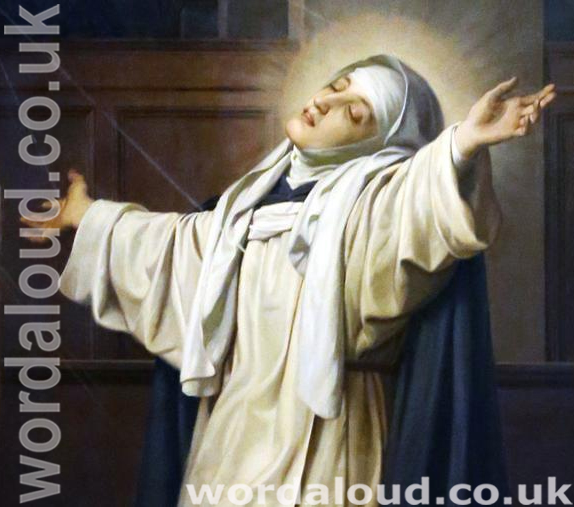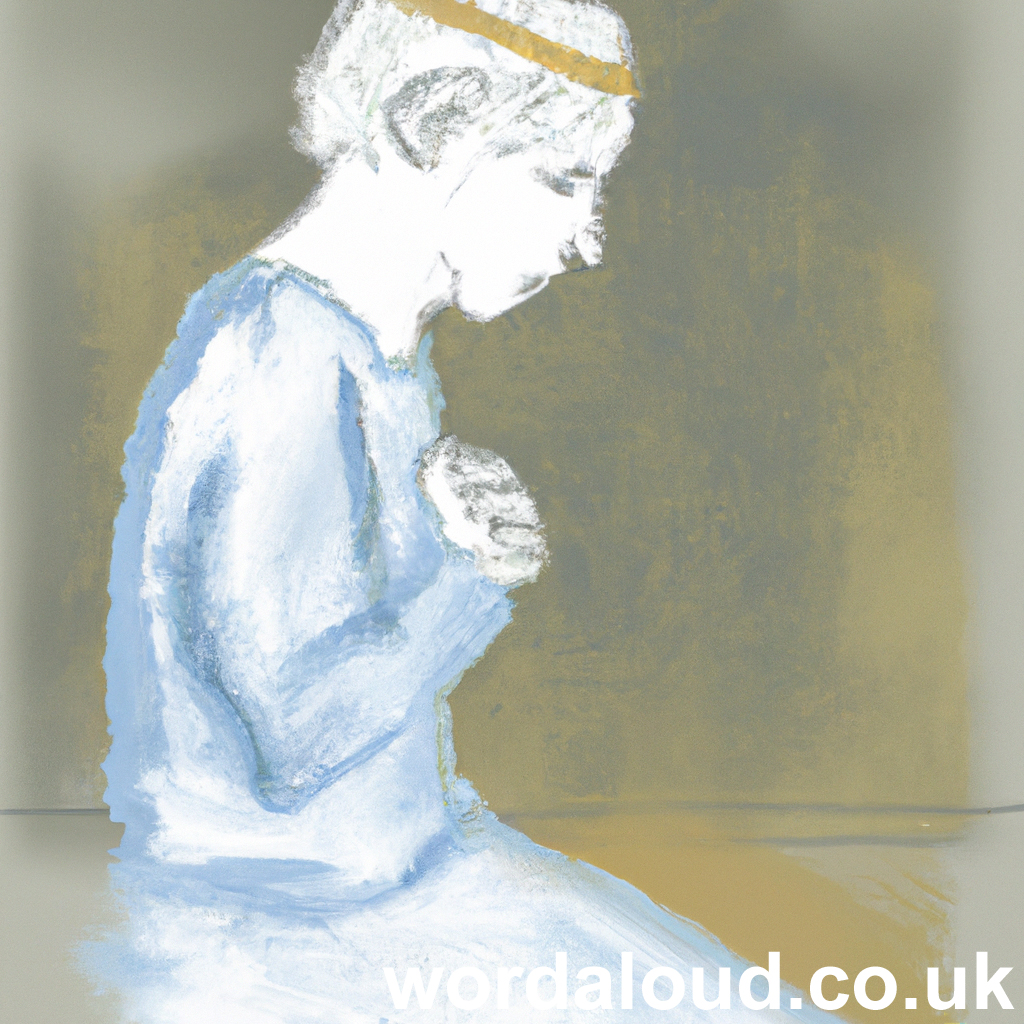Christian Art | A Boy At Prayer | The Body And Blood Of Jesus Christ In The Eucharist
Office Of Readings | Week 15, Friday, Ordinary Time | A Reading From The Treatise Of Saint Ambrose On The Mysteries | Neophytes And The Eucharist
‘Neophytes and the eucharist.’
Saint Ambrose is addressing new Christians during the Easter season, shortly after they have received baptism. These ‘neophytes’ have just emerged from the waters of rebirth, wearing white robes to signify purity and new life. Now, he prepares them to receive the Eucharist — not just as a symbol or ritual, but as the real Body and Blood of Jesus Christ.
Saint Ambrose draws on Scripture, Jewish tradition, and the Church’s own liturgy to explain how the Eucharist completes their Christian initiation. His style is poetic yet precise, always inviting awe and faith in what has taken place.
From Baptism To Banquet
‘Fresh from the waters… to the altar of Christ.’
Saint Ambrose begins by describing the neophytes as hurrying joyfully to the altar, still clothed in the white garments they received at baptism. He quotes Psalm 43 (42), ‘I will go to the altar of God, to God who gives joy to my youth,’ suggesting that this moment — their first Eucharist — is one of deep renewal and spiritual joy. He even compares them to eagles whose youth is renewed (Psalm 103), a powerful image of transformation and divine strength.
The context is liturgical: in the ancient Roman rite, the newly baptized would process from the baptistery into the main church to receive Communion. Ambrose brings out the theological meaning behind this: their spiritual hunger is now being fed by Christ himself.
The Fulfilment Of Psalm 23
‘You have prepared a table in my sight… your cup, which exhilarates, how excellent it is.’
Saint Ambrose next quotes extensively from Psalm 23, one of the best-loved passages in the Bible. He sees it as a prophetic description of the Eucharist. The ‘table’ is now the altar. The ‘cup’ is the chalice of Christ’s blood, which brings not only joy but eternal life. The shepherd who leads the Psalmist beside ‘refreshing waters’ is Christ, and the ‘oil’ refers to the anointing received at baptism.
This reading is part of a broader early Christian tradition of finding Christ hidden throughout the Old Testament — a method called typology. Ambrose’s point is simple but profound: the Scriptures were always pointing to this sacrament, and now it has come.
Manna And The Living Bread
‘Man ate the bread of angels… yet those who ate that bread all died in the desert.’
Ambrose now turns to the Old Testament story of manna — the miraculous bread from heaven that fed the Israelites during their journey through the wilderness (Exodus 16). This manna was called the ‘bread of angels’ in Psalm 78, but it could only nourish the body temporarily.
In contrast, Ambrose explains, the Eucharist — the Body of Jesus Christ — is food that gives eternal life. He quotes John 6 (Jesus’ Bread of Life discourse), where Christ himself makes the same point. This helps the neophytes see that they are receiving something far greater than their Jewish ancestors ever did.
Ambrose also uses this comparison to highlight a shift from symbol to reality: manna foreshadowed the Eucharist, but the Eucharist is the true, living bread.
From The Rock To The Cross
‘For our fathers, water flowed from the rock; for you, blood flows from Christ.’
Ambrose deepens the comparison with another dramatic story from Israel’s past: when Moses struck the rock in the desert and water flowed to quench the people’s thirst (Exodus 17). According to Saint Paul (1 Corinthians 10:4), this rock symbolised Christ.
Now, says Ambrose, something even more wondrous has happened: not water, but Jesus Christ’s own blood flows — not from a rock, but from the cross. Water gave temporary relief; the blood of Jesus Christ cleanses the soul eternally.
Here we see Ambrose teaching that everything in the Old Covenant was preparing for the New. The signs and shadows have passed; now comes the truth.
Shadow And Reality
‘If what you marvel at is a shadow, how great is the reality whose very shadow you marvel at?’
Ambrose closes with a powerful reflection on how much greater the reality is than its foreshadowing. If the ancient miracles — manna, water from the rock — were already awe-inspiring, how much more should we revere the Eucharist?
He urges his hearers to recognise the deeper meaning of what they have received: not a symbol, but Jesus Christ himself. This teaching mirrors the deep reverence of early Christians for the Eucharist — as the real presence of the crucified and risen Lord.

A Reading From The Treatise Of Saint Ambrose On The Mysteries | Neophytes And The Eucharist
Fresh from the waters and resplendent in these garments, God’s holy people hasten to the altar of Christ, saying: I will go in to the altar of God, to God who gives joy to my youth. They have sloughed off the old skin of error, their youth renewed like an eagle’s, and they make haste to approach that heavenly banquet. They come and, seeing the sacred altar prepared, cry out: You have prepared a table in my sight. David puts these words into their mouths: The Lord is my shepherd and nothing will be lacking to me. He has set me down there in a place of pasture. He has brought me beside refreshing water. Further on, we read: For though I should walk in the midst of the shadow of death, I shall not be afraid of evils, for you are with me. Your rod and your staff have given me comfort. You have prepared in my sight a table against those who afflict me. You have made my head rich in oil, and your cup, which exhilarates, how excellent it is.
It is wonderful that God rained manna on our fathers and they were fed with daily food from heaven. And so it is written: Man ate the bread of angels. Yet those who ate that bread all died in the desert. But the food that you receive, that living bread which came down from heaven, supplies the very substance of eternal life, and whoever will eat it will never die, for it is the body of Christ.
Consider now which is the more excellent: the bread of angels or the flesh of Christ, which is indeed the body that gives life. The first was manna from heaven, the second is above the heavens. One was of heaven, the other is of the Lord of the heavens; one subject to corruption if it was kept till the morrow, the other free from all corruption, for if anyone tastes of it with reverence he will be incapable of corruption. For our fathers, water flowed from the rock; for you, blood flows from Christ. Water satisfied their thirst for a time; blood cleanses you for ever. The Jew drinks and still thirsts, but when you drink you will be incapable of thirst. What happened in symbol is now fulfilled in reality.
If what you marvel at is a shadow, how great is the reality whose very shadow you marvel at. Listen to this, which shows that what happened in the time of our fathers was but a shadow. They drank, it is written, from the rock that followed them, and the rock was Christ. All this took place as a symbol for us. You know now what is more excellent: light is preferable to its shadow, reality to its symbol, the body of the Giver to the manna he gave from heaven.
Prayer With Jesus
Lord Jesus Christ,
You are the Bread of Life,
given for the life of the world.
You call us to your table,
to feed us with your very self.
May we receive this gift with awe and joy.
May it renew our strength,
cleanse our hearts,
and unite us with your Body, the Church.
Keep us always faithful to your altar,
until we feast with you in the kingdom of heaven.
Amen.
Glossary Of Christian Terms
- Neophyte – A newly baptized Christian, especially during the Easter season.
- Eucharist – The sacrament of the Body and Blood of Christ, celebrated in Holy Communion.
- Manna – The miraculous bread God provided for the Israelites in the desert (Exodus 16).
- Typology – A method of biblical interpretation where Old Testament events are seen as prefiguring New Testament realities.
- Psalm 23 – A beloved psalm that speaks of God as a shepherd; interpreted here as a prophecy of the Eucharist.
- Altar – The table where the Eucharist is celebrated; symbolises both sacrifice and banquet.
- Shadow and reality – A theme in early Christian theology (especially Hebrews 10:1), where the Old Testament is seen as a shadow of Christ’s coming.
- Living Bread – A term Jesus uses in John 6 to describe himself as the source of eternal life.








